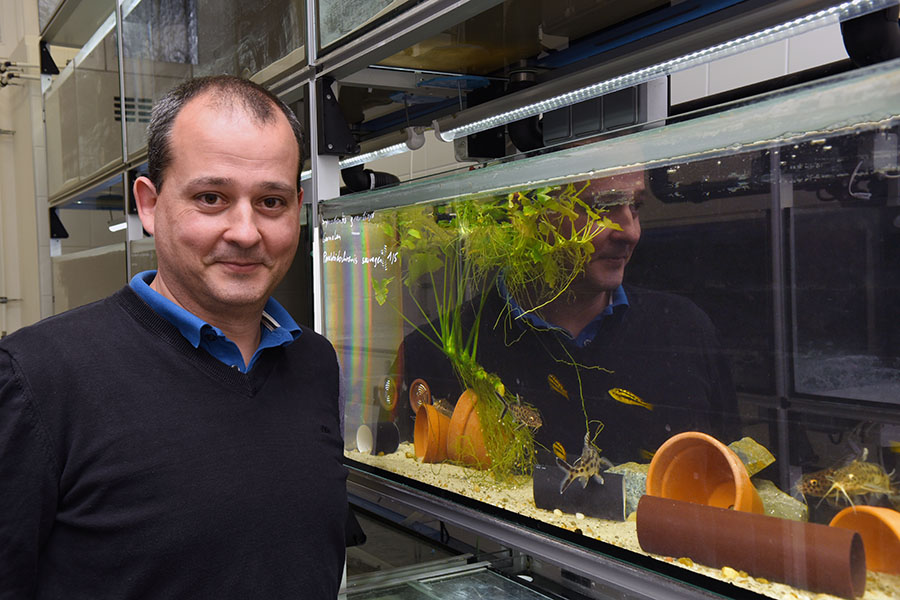Der sprichwörtliche stumme Fisch ist eine Mär. Tatsächlich gibt es zahlreiche Fischarten, die Laute von sich geben. Im Zuge der Evolution hat sich diese Fähigkeit herausgebildet. Mit ihrem „Gesang“ werben Männchen um Weibchen oder verjagen Eindringlinge aus ihrem Revier. Das gilt für die Koppe – ein kleiner heimischer Grundfisch – ebenso wie für die räuberischen Piranhas in Südamerika. Letztere sind Objekt der Forschung von Boris Chagnaud, seit 1. September 2018 Professor für Zoologie an der Universität Graz.
Der Neurobiologe untersucht, wie sich Netzwerke von Nervenzellen im Gehirn verändern müssen, um ein neues Verhalten hervorzubringen. „Piranhas erzeugen mit ihrem Rückenmark Signale, die einen Muskel so stimulieren, dass er auf die Schwimmblase trommelt. Auf diese Weise werden Laute erzeugt“, erklärt Chagnaud und fügt hinzu: „In früheren Phasen der Evolution diente das neuronale Netzwerk, das die lautproduzierenden Muskeln kontrolliert, jedoch ausschließlich der Fortbewegung.“ Die Frage, die der Forscher beantworten möchte: Wie haben sich die neuronalen Strukturen angepasst, so dass sich die Funktion des neuronalen Netzwerkes veränderte und die Fische zu singen begannen?
Dieses Zusammenspiel zwischen Gehirn und Verhalten ist universell. Der Zoologe hat es auch an anderen Tieren untersucht, etwa an der Klapperschlange und ihrem Rasseln. „Die Verschaltungen im zentralen Nervensystem bestimmen die Funktion eines Muskels. Ein neues Verhalten geht Hand in Hand mit neuronalen Veränderungen“, so Chagnaud.
Um das Netzwerken von Neuronen sichtbar zu machen und die Funktionen der verschiedenen Zelltypen im Zusammenwirken erforschen zu können, verfolgt Chagnaud die Prozesse über Elektroden im Gehirn. Eine andere Methode ist, die Neuronen einzufärben und ihnen unter dem Fluoreszenzmikroskop bei der Arbeit zuzusehen.
Zum Weiterdenken inspirieren die geplanten Forschungen des Biologen zur Steuerung der Brustflossen von Fischen. Wenn es gelingt, die neuronalen Muster, die dem Verhalten der Extremitäten zugrunde liegen, zu entschlüsseln, könnte dies vielleicht sogar im Hinblick auf die Steuerung von Hand- oder Armprothesen von Interesse sein.
Studiert und promoviert hatte der Wissenschafter mit deutsch-französischen Wurzeln in Bonn. Als Postdoc forschte er von 2007 bis 2011 an der Cornell University in Ithaca im US-Bundesstaat New York, bevor er sich an der Ludwig-Maximilians-Universität in München habilitierte. 2015 war Chagnaud an der Organisation der Jahrestagung der Deutschen Zoologischen Gesellschaft beteiligt, die in Graz stattfand. Universität und Stadt haben einen wundervollen Eindruck hinterlassen, sagt er. Dass es ihn einmal hierher verschlagen würde, hatte der Neurobiologe damals allerdings nicht gedacht.
